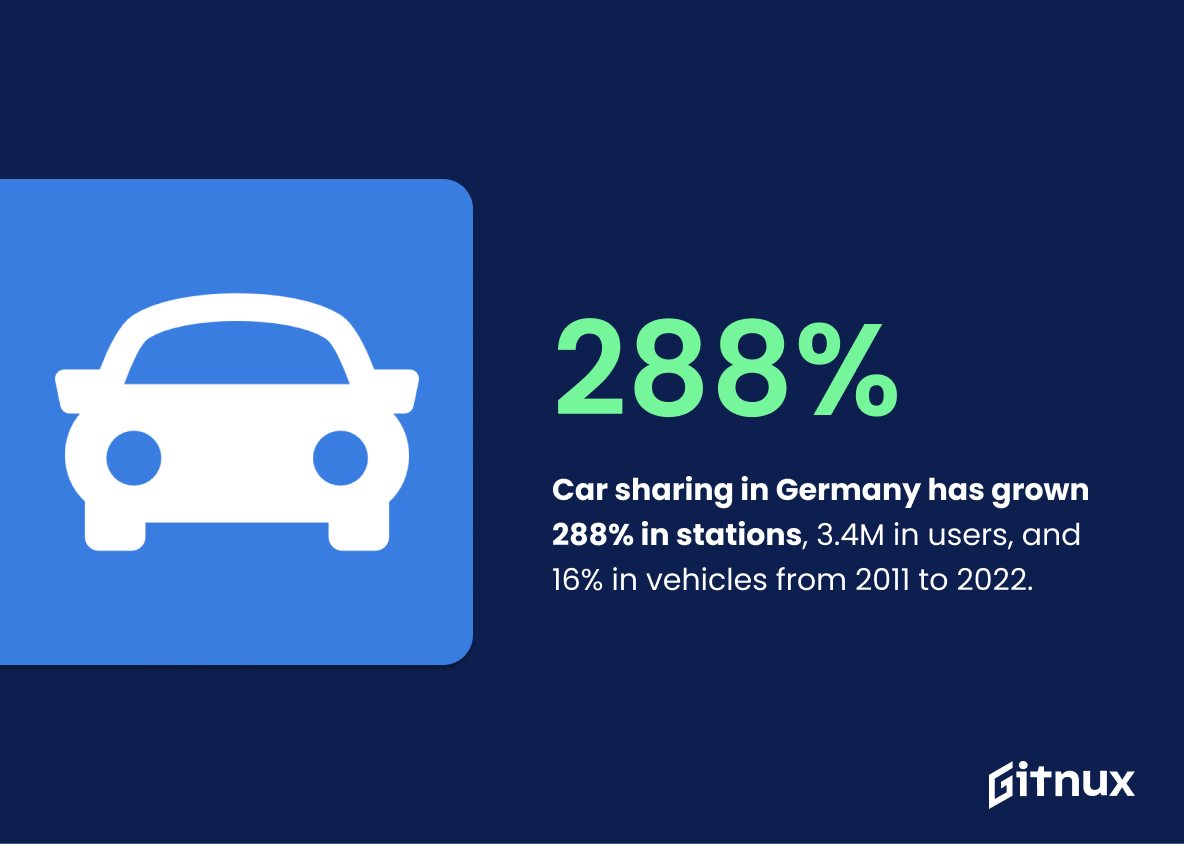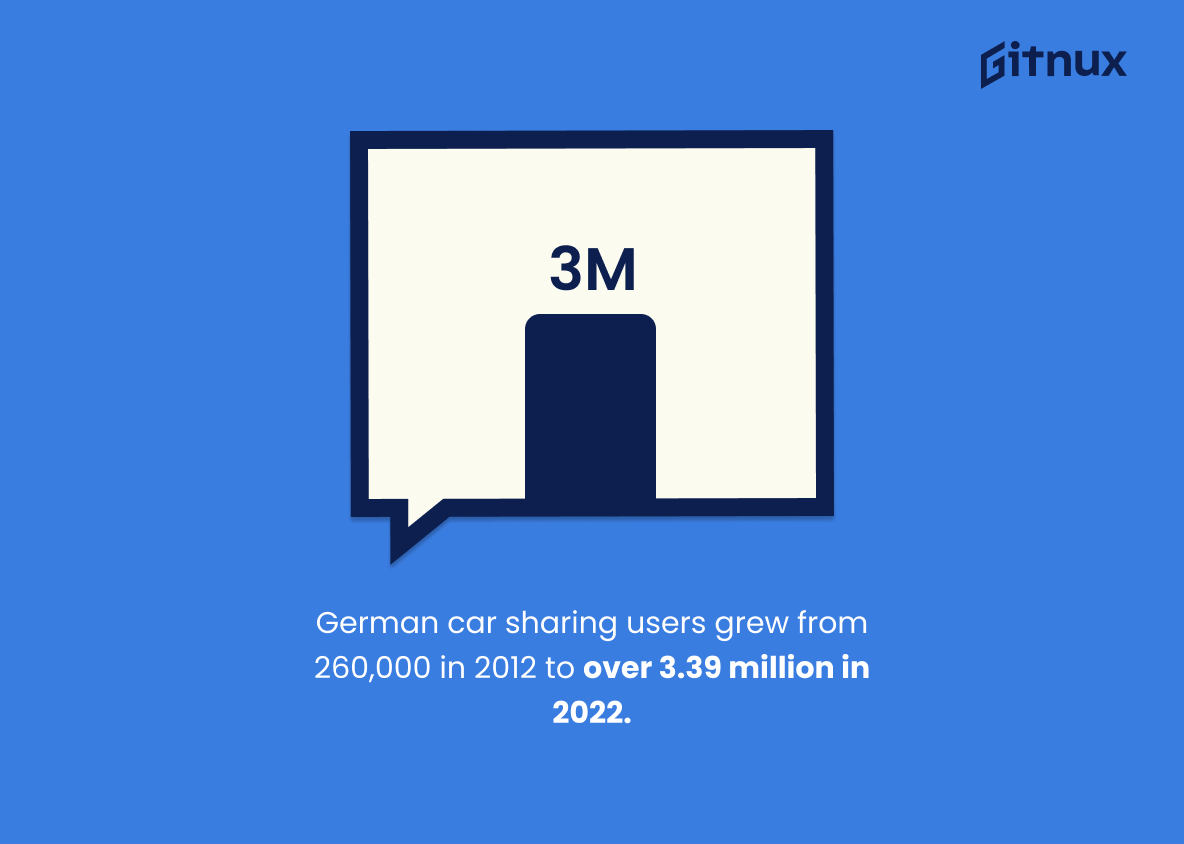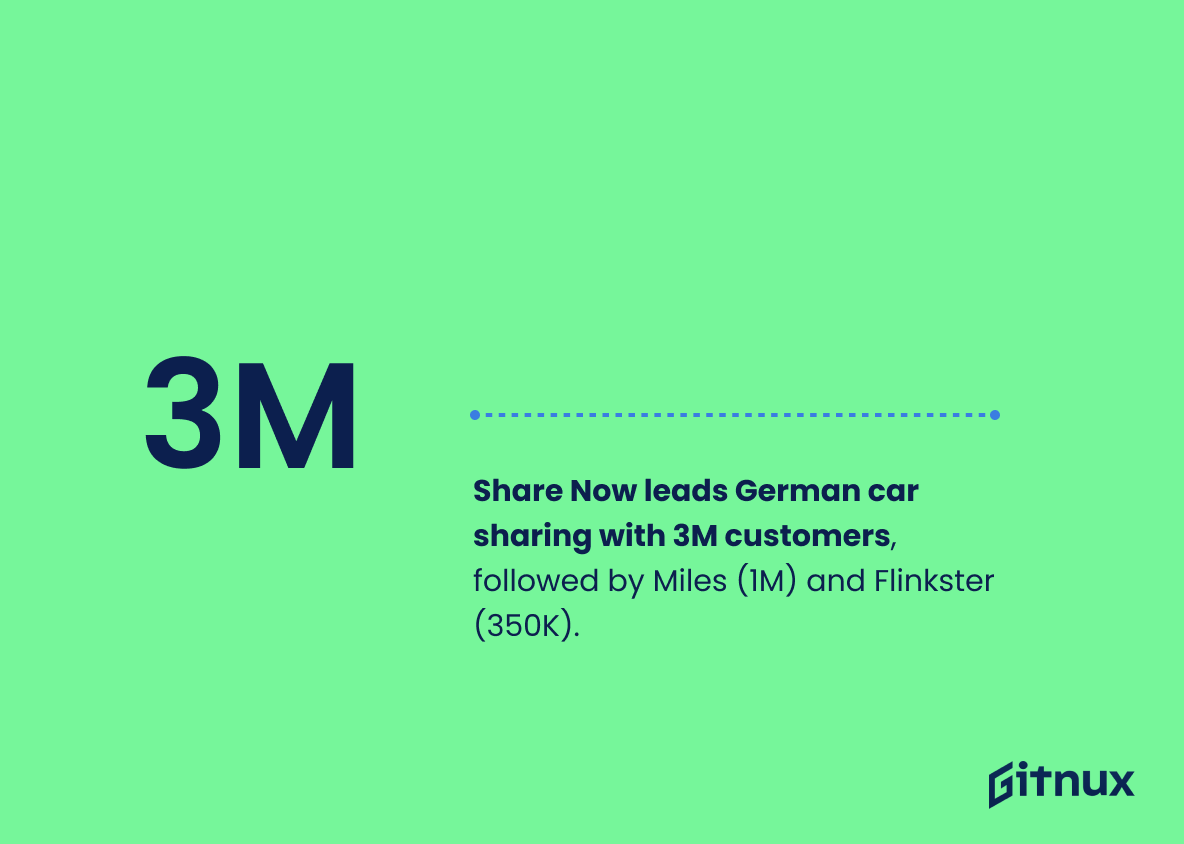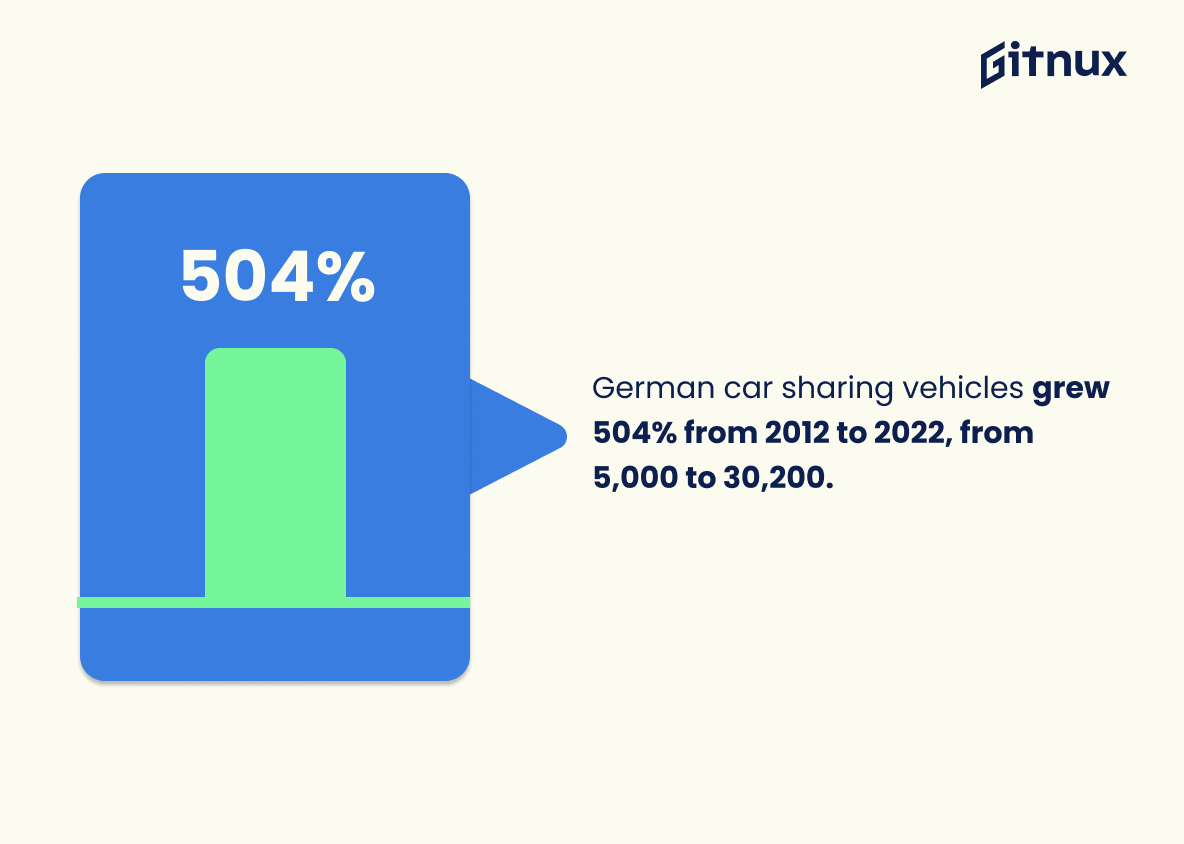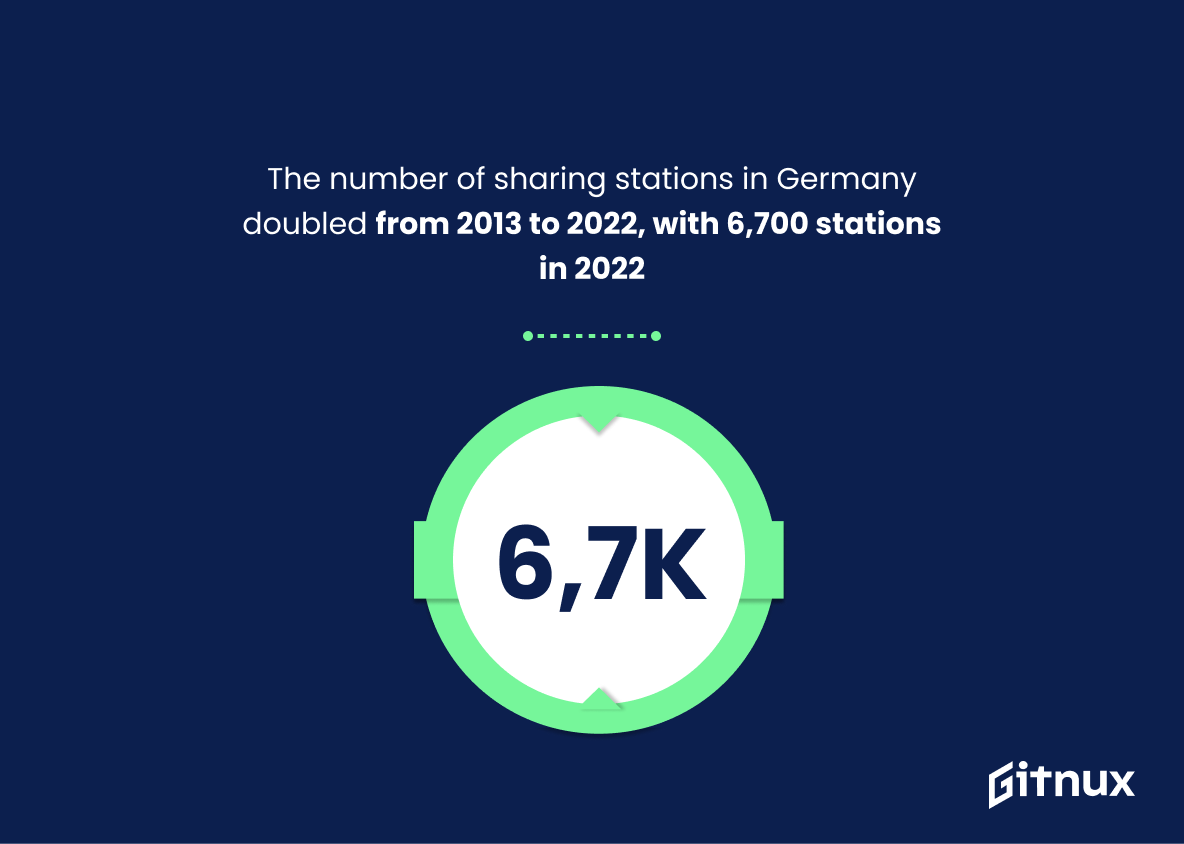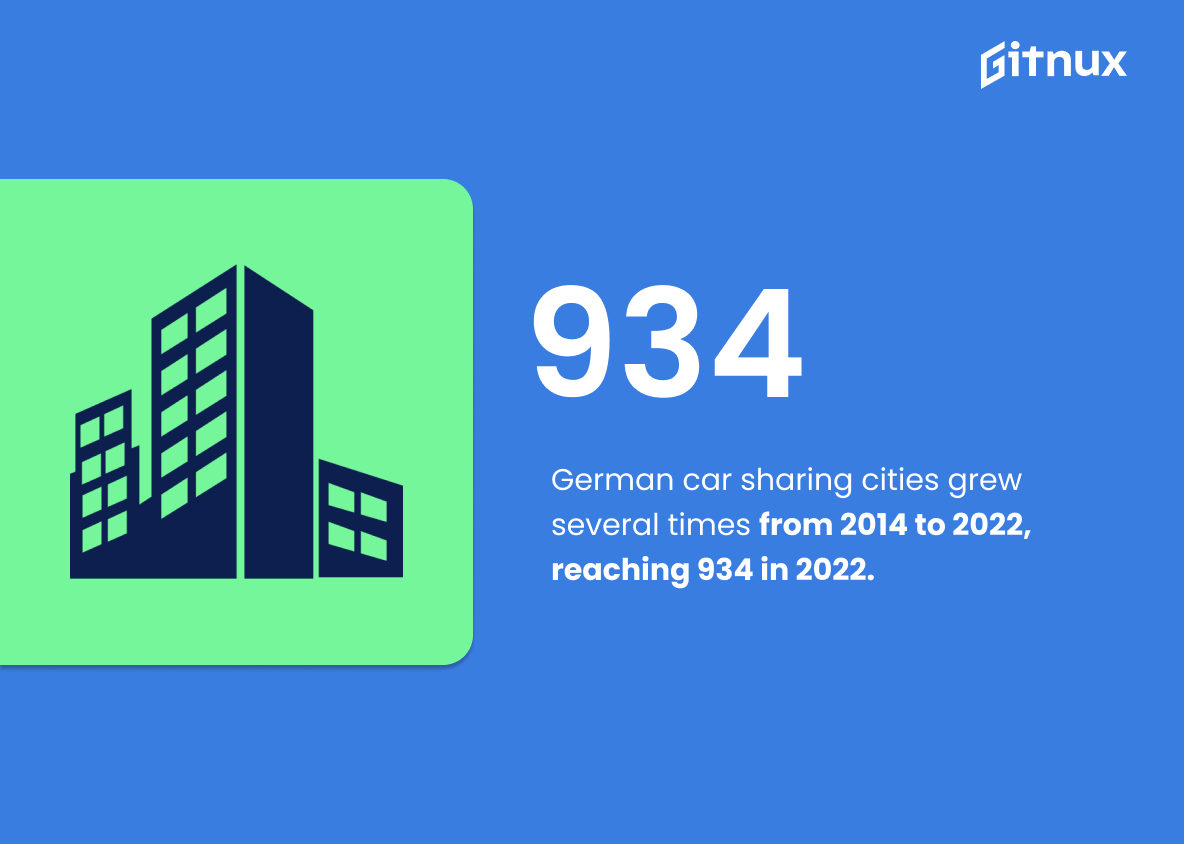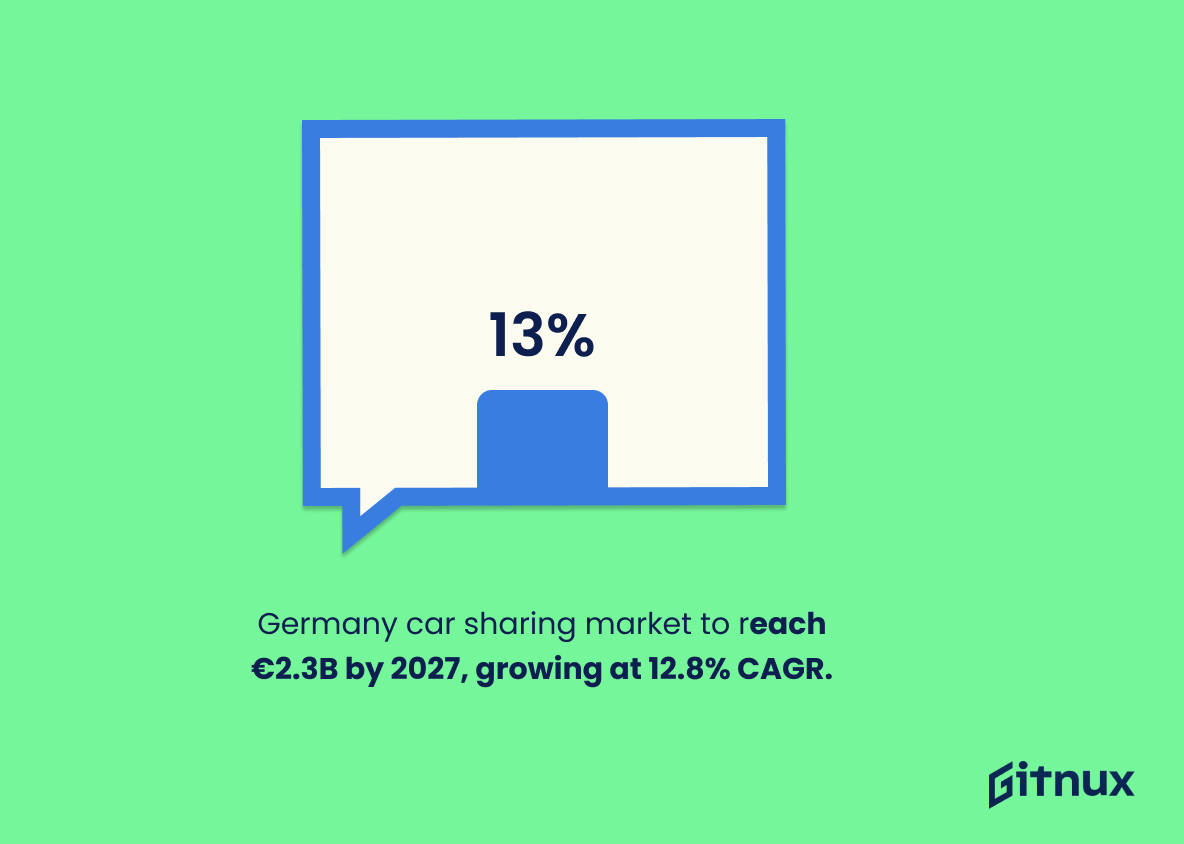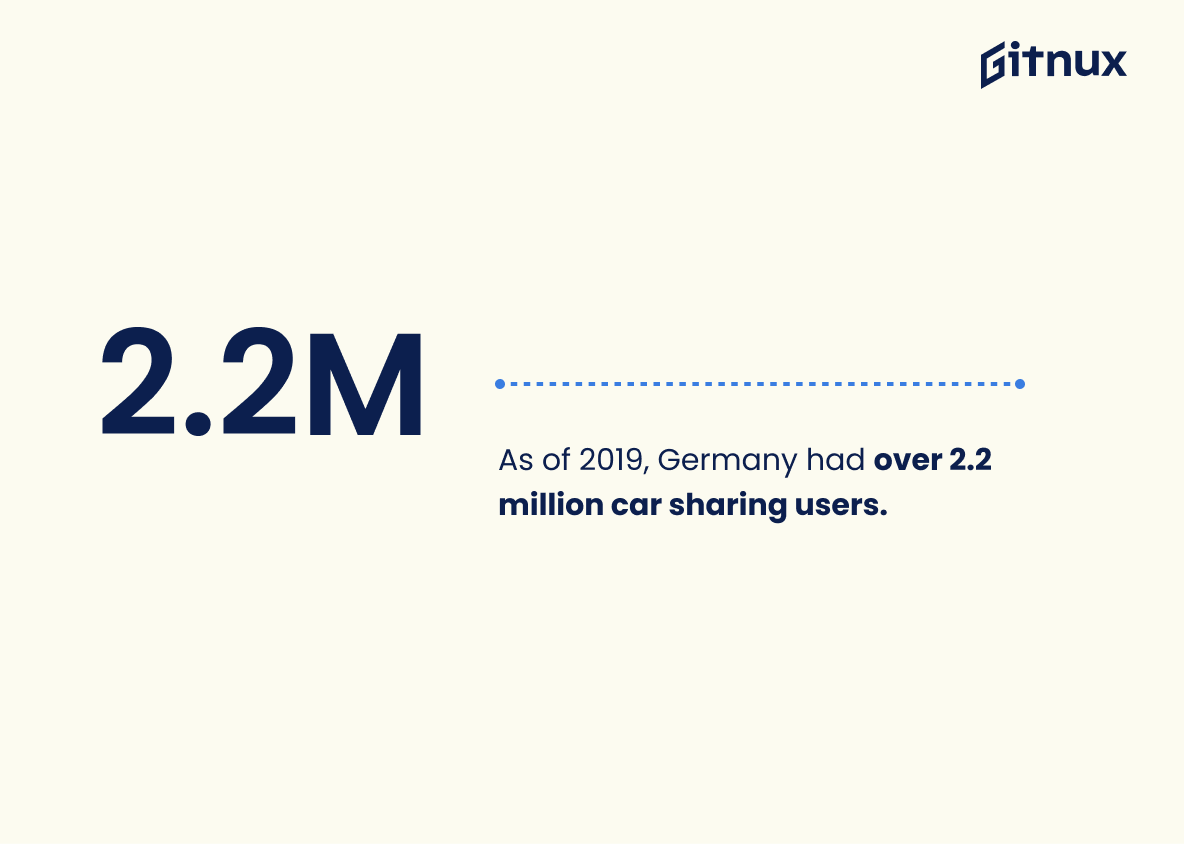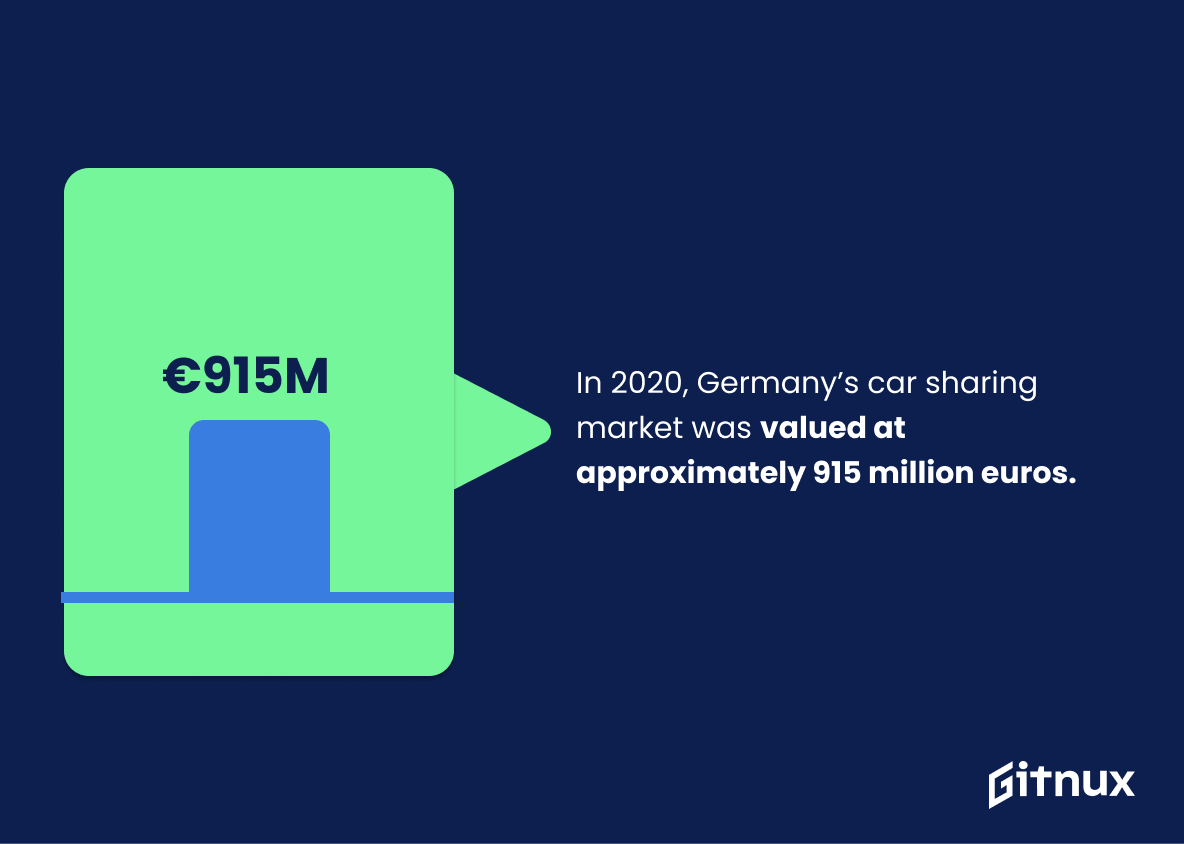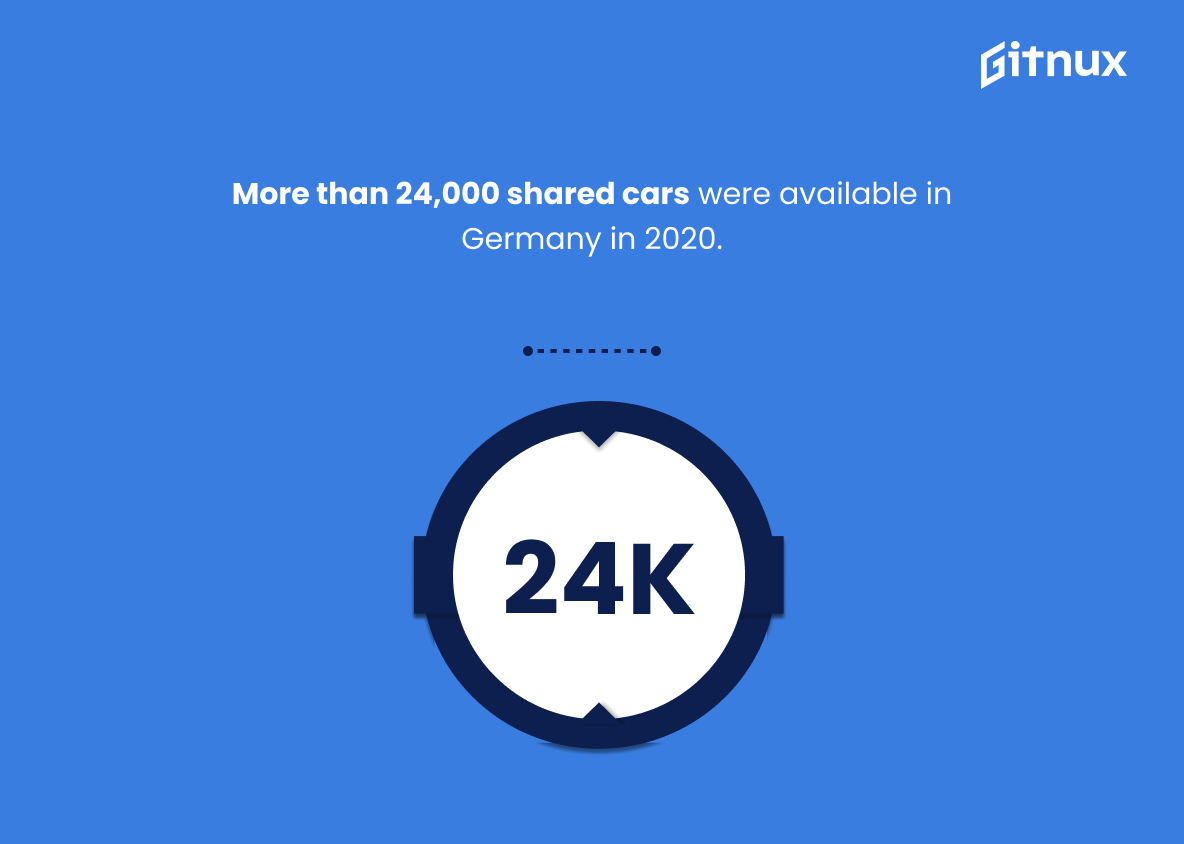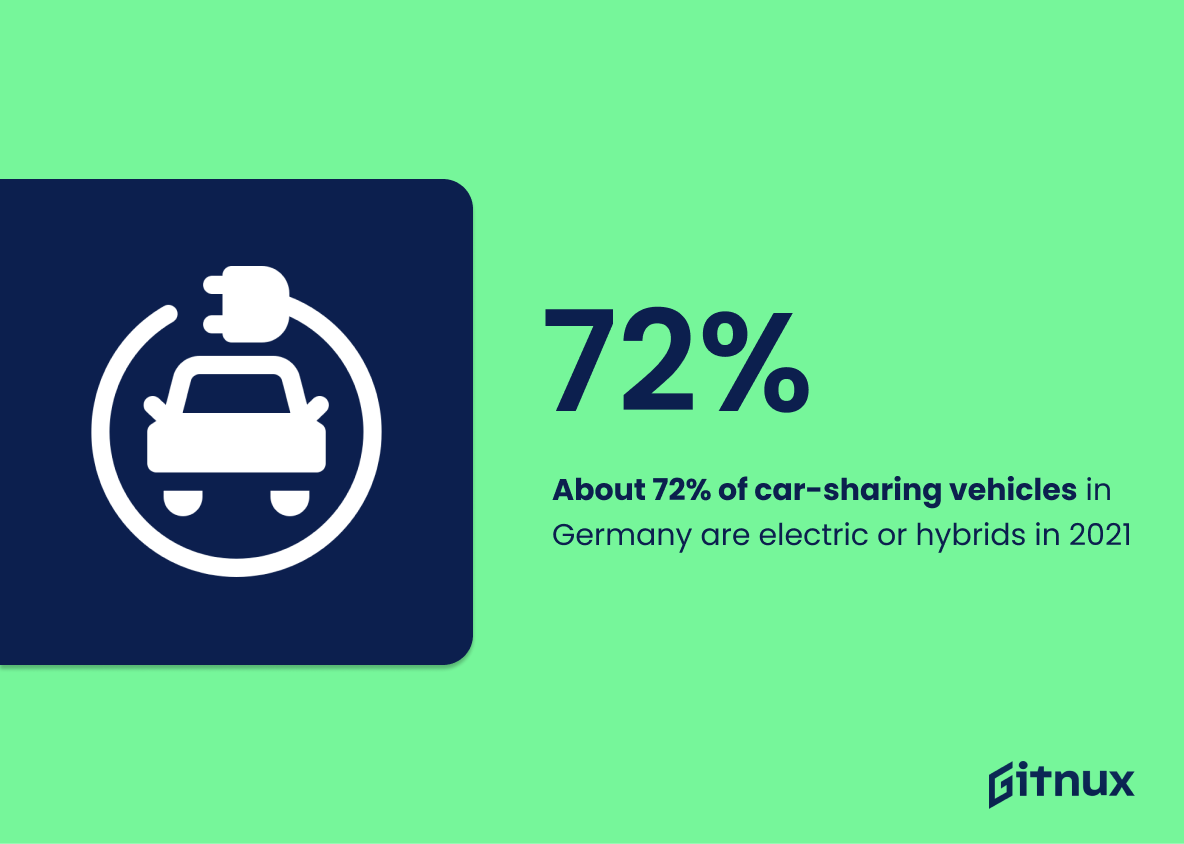Germany is one of the most advanced countries in the world when it comes to car sharing. With over 1.7 million registered users, Germany is the largest car sharing market in Europe.
This article will explore the statistics behind car sharing in Germany, including the number of users, the types of cars available, and the benefits of car sharing. We will also look at the future of car sharing in Germany and how it is likely to develop. Finally, we will discuss the potential impact of car sharing on the environment and the economy.
Car Sharing in Germany: Important Statistics
The number of registered car sharing users in Germany has grown from 260,000 in 2012 to over 3.39 million in 2022.
Share Now is the most popular car sharing service in Germany, with 3 million customers, followed by Miles (over one million users) and Flinkster (350 000 customers).
Car Sharing in Germany: Statistics Overview
Car Sharing in Germany has seen a 288% increase in stations, a 3.4 million increase in users, and a 16% increase in vehicles from 2011-2022.
This shows the growth of car sharing services in Germany over the past decade. This growth indicates that car sharing is becoming increasingly popular in Germany, which could have positive implications for the environment, traffic, and the economy.
The number of registered car sharing users in Germany has grown from 260,000 in 2012 to over 3.39 million in 2022.
More and more people are choosing to use car sharing services as a way to get around, which could lead to a reduction in the number of cars on the road and less traffic congestion.
Additionally, it could lead to a decrease in emissions and an overall reduction in environmental impact.
Share Now is the most popular car sharing service in Germany, with 3 million customers, followed by Miles (over one million users) and Flinkster (350 000 customers).
This shows which services are the most popular and successful.
The number of vehicles in German car sharing services has grown from 5,000 in 2012 to 30,200 in 2022, representing a 504% increase.
More people are turning to car sharing services as an alternative to owning a car, which can have a positive environmental impact as fewer cars are on the road.
Additionally, it can also be seen as an indication of the increasing popularity of car sharing services in Germany.
The number of sharing stations in Germany doubled from 2013 to 2022, with 6,700 stations in 2022, due to the increasing number of vehicles in car sharing services.
This shows the growth of the car sharing industry in the country. This growth is likely due to the increasing popularity of car sharing services, which are becoming an increasingly popular alternative to traditional car ownership.
The statistic also shows that the car sharing industry is growing at a rapid rate, which could have a positive impact on the environment and economy in Germany.
The number of cities and towns in Germany with car sharing services has increased several times between 2014 and 2022, with 934 cities and towns having car sharing stations in 2022.
This increase in popularity of car sharing services is important because it demonstrates the growing demand for this type of transportation option, which could lead to more efficient transportation solutions and reduced emissions.
Germany’s car sharing market is expected to reach a total of 2,317.9 million euros by 2027, growing at a compound annual growth rate (CAGR) of 12.8 % between 2020 and 2027.
The market is expected to grow significantly over the next seven years, with a compound annual growth rate of 12.8%. This suggests that car sharing is becoming increasingly popular in Germany, and that it is a viable option for those looking to save money on transportation costs. As such, this statistic is an important piece of information for anyone interested in learning more about car sharing in Germany.
As of 2019, Germany had over 2.2 million car sharing users.
More and more people are turning to car sharing as an alternative to owning a car, which can be a costly and time-consuming endeavor. This statistic is also important in understanding the impact car sharing is having on the environment, as it reduces the number of cars on the road and the amount of emissions they produce.
In 2020, Germany’s car sharing market was valued at approximately 915 million euros.
The industry has become increasingly popular and profitable in the country, and is likely to continue to do so in the future. This is an important point to make in a blog post about car sharing in Germany, as it demonstrates the potential of the industry and the opportunities it presents for businesses and consumers alike.
More than 24,000 shared cars were available in Germany in 2020.
More and more people are turning to this convenient and cost-effective way of getting around. It also indicates that car sharing is becoming an increasingly viable option for those looking for an alternative to owning a car. This statistic is an important piece of evidence for anyone looking to learn more about the state of car sharing in Germany.
About 72% of car-sharing vehicles in Germany are electric or hybrids in 2021
The country is taking steps to reduce its carbon footprint and promote sustainability. This is an important step in the right direction for Germany and the world as a whole.
In 2018, car-sharing users in Germany travelled over 288 million kilometers.
People are taking advantage of the convenience and cost-effectiveness of car-sharing, and that it is becoming an increasingly popular way to get around. This statistic is a testament to the fact that car-sharing is becoming an increasingly viable option for those looking for an alternative to traditional car ownership.
German car-sharing market generated 1.24 billion kilometers driven in 2017.
It has become a popular and viable option for many people in the country. It shows that car-sharing is not only a convenient and cost-effective way to get around, but also a safe and reliable one. This statistic is a powerful indicator of the potential of car-sharing in Germany, and is an important piece of information for anyone interested in learning more about the car-sharing industry in the country.
From 2015 to 2019, annual growth of car sharing users in Germany was 39% on average.
More and more people are turning to car sharing as a viable transportation option, and that the trend is only growing. This is an important statistic to consider when discussing the current state of car sharing in Germany, as it demonstrates the potential for further growth in the future.
Free-floating car sharing represented 63% of the German market in 2019.
The majority of car sharing users in the country are opting for this type of service, suggesting that it is a popular and convenient option for those looking to get around. This statistic is important to consider when discussing the car sharing industry in Germany, as it provides insight into the preferences of the German public.
In 2019, the total number of car-sharing stations in Germany was over 5,000.
More and more people are turning to car-sharing as an alternative to owning a car, which is great news for the environment and for those looking to save money on transportation costs. This statistic is an important part of understanding the current state of car-sharing in Germany and is essential for any blog post about car-sharing in Germany statistics.
Car-sharing users in Germany are primarily between 25 and 39 years old, accounting for 60% of the total users.
The majority of users are within a certain age range. This suggests that car-sharing is particularly attractive to those in their late twenties and thirties, and could be a useful insight for those looking to market car-sharing services in Germany.
In 2020, the average age of a car-sharing vehicle was 2.3 years, compared to the average age of privately owned cars which was 9.6 years.
Car-sharing vehicles are much newer than privately owned cars, which suggests that car-sharing is becoming increasingly popular in the country. This could be due to the convenience and cost-effectiveness of car-sharing, as well as the environmental benefits it provides. This statistic is important to consider when discussing the impact of car-sharing in Germany, as it demonstrates the growing popularity of this form of transportation.
23 German cities had more than 100 shared vehicles each in 2019.
It has become a popular option for many people in the country. It shows that car sharing is not only a viable option, but a preferred one for many, as 23 cities had more than 100 shared vehicles each in 2019. This is a clear indication that car sharing is becoming an increasingly popular choice for those looking for an affordable and convenient way to get around.
Car-sharing trips accounted for 0.2% of all trips made in Germany in 2017.
More and more people are turning to this convenient and cost-effective mode of transportation. It also serves as a reminder of the potential for car-sharing to reduce traffic congestion and emissions, making it an important part of the country’s efforts to become more sustainable.
Car-sharing stations in Germany increased by 45% from 2015 to 2019.
More and more people are turning to car-sharing as a viable transportation option, which is great news for the environment and for those looking to save money on transportation costs. This statistic is an important part of the story of car-sharing in Germany and should be included in any blog post about car-sharing in Germany statistics.
Mileage-based costs of using car-sharing services in Germany vary from 0.23 Euros to 0.87 Euros per kilometer depending on the car type.
The cost of using these services can vary significantly depending on the type of car chosen, providing an insight into the potential savings that can be made by opting for a more economical option. This information is essential for anyone considering using car-sharing services in Germany, as it allows them to make an informed decision about which car type is best suited to their needs and budget.
Users of car-sharing services in Germany have a higher rate of public transport usage (76%) compared to those without car sharing memberships (67%).
Car-sharing services have encouraged more people to use public transport, which is beneficial for the environment and the economy. This statistic is an important piece of evidence that car-sharing services are having a positive effect on the country, and should be highlighted in any blog post about car-sharing in Germany.
Conclusion
In conclusion, car sharing in Germany is a growing trend that is becoming increasingly popular. It offers a convenient and cost-effective way for people to get around without having to own a car. The statistics show that the number of car sharing users is increasing, and the number of cars available for sharing is also growing.
This trend is likely to continue in the future, as more people become aware of the benefits of car sharing and its potential to reduce traffic congestion and emissions.
References
1 – https://www.statista.com/topics/4665/car-sharing-industry-in-germany/#topicOverview
2 – https://www.statista.com/statistics/415635/car-sharing-registered-users-gemany/
3 – https://www.statista.com/statistics/415307/car-sharing-companies-by-customer-numbers-germany/
4 – https://www.statista.com/statistics/808220/car-sharing-number-of-vehicles-germany/
5 – https://www.statista.com/statistics/415360/car-sharing-number-of-stations-germany/
6 – https://www.statista.com/statistics/415319/cities-with-car-sharing-services-in-germany/
7 – https://www.researchandmarkets.com
8 – https://www.statista.com
9 – https://www.carsharing.de
10 – https://www.umweltbundesamt.de
11 – https://eliptic-project.eu
12 – https://www.prnewswire.com
13 – https://ec.europa.eu
14 – https://www.mckinsey.com
15 – https://www.dw.com
16 – https://www.nature.com
17 – https://www.carjump.de
18 – https://www.bmu.de
19 – https://elib.dlr.de
